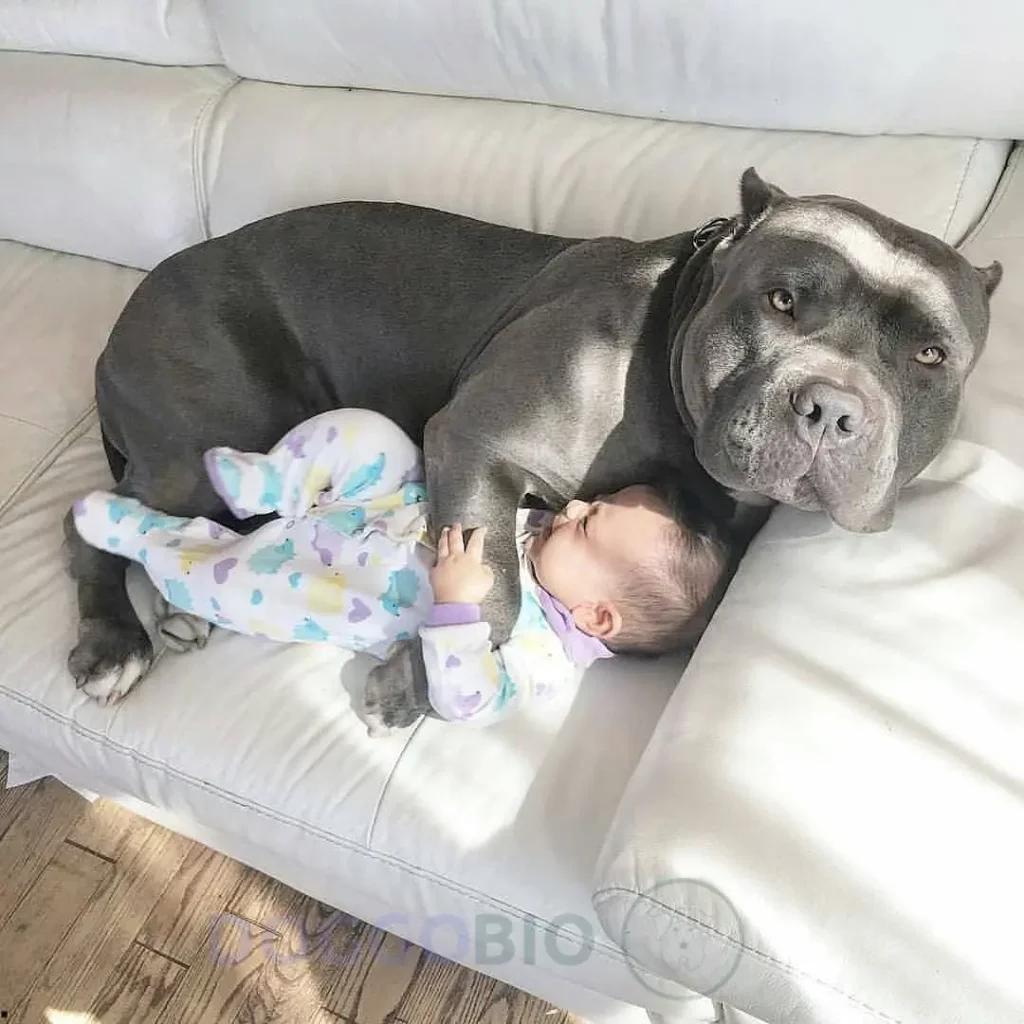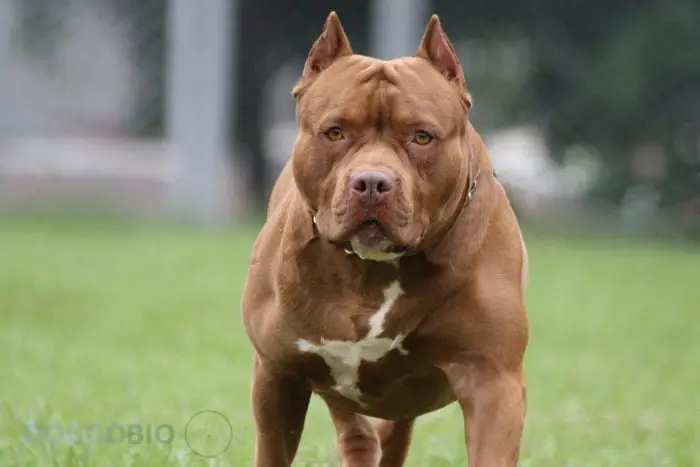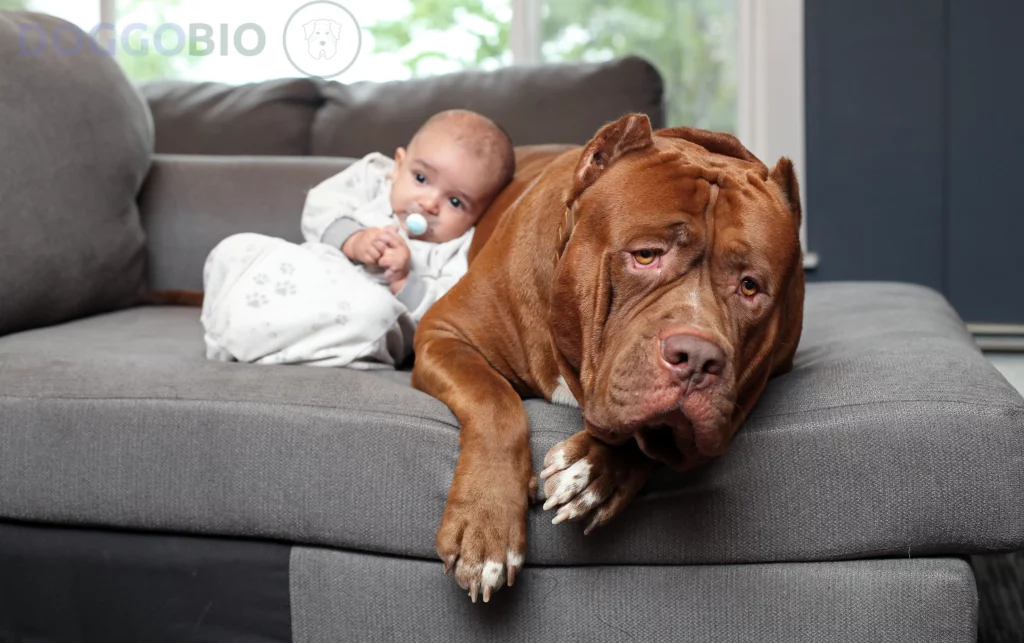Pitbull and baby have been controversial for many years, with some people expressing concerns over the safety of having these two together. On the one hand, pit bulls are known for their strength, loyalty, and protective nature, making them popular as family pets. On the other hand, babies are vulnerable and require the utmost care and protection. While some individuals may be hesitant to introduce their babies to pit bulls, some believe these dogs can make excellent companions for young children with proper training and socialization.
This article will we’ll address common questions about relationship between Pitbulls and babies, discussing these interactions’ benefits and potential risks. We will also provide tips and advice on introducing pitbulls to babies and promoting a safe and happy coexistence between them.
Are Pitbulls Good With Kids?
Whether Pitbulls and babies are amicable with each other is a multifaceted topic that requires careful analysis. On the one hand, some assert that Pitbulls are congenial with infants, while others contend that they are not.
Examining both sides of the debate to form an informed opinion and determine the ideal situation for your family’s well-being is imperative.

Yes, Pitbulls Are Safe Around Babies
Are Pitbulls safe around babies? The answer is a resounding yes, according to some Pitbull owners. But why do they say that? Well, for one, Pitbulls make great companions. They love to please their humans, big or small and don’t mind the loud crying or wailing sounds of babies. You can find plenty of photos online showing cute babies snuggled up with their Pitbull siblings or with the dogs sniffing them.
Some of these pictures show babies sleeping next to the Pitbulls’ faces and drooling on their ears, leading some to refer to Pitbulls as “nanny dogs.” And it does not just picture: Pitbulls get along with babies, toddlers, and kids and make great canine companions. Nowadays, Pitbulls are bred for companionship, not sports, and many believe they have successfully fulfilled that role.
According to the United Kennel Club (UKC), Pitbulls are enthusiastic, loyal, always wanting to please their owners, and full of life. UKC also notes that Pitbulls love children and make great additions to families. This information is based on years of observation and experience with Pitbulls and babies.
Of course, like all dog breeds, Pitbulls’ temperament and personality combine genetics and environment. However, personality development is more heavily influenced by the environment than genetics. This means how Pitbulls are treated and raised affects their temperament and personality. Proper training and humane treatment are crucial to ensuring that Pitbulls get along with other dogs, animals, and people around them.
No, Pitbulls Are Not Safe Around Babies
Are Pitbulls safe around babies? It’s a resounding no from one side of the debate.
Many experts warn against the idea of having Pitbulls and babies. Pitbulls are known for their aggressive nature, which can lead to dangerous situations with babies and young children. Pitbull bites have caused more fatalities than any other dog breed.
A pediatrician, Laura Marusinec, wrote in the Herald-Tribune that many studies have shown that Pitbulls make up a significant percentage of dog bites in babies and children. Marusinec believes parents should not have Pitbulls if they are expecting a baby soon or have babies or children in the home. Even though every Pitbull is different, she stated that medical studies indicate that the Pitbull dog caused half of the damaging injuries in children.
In conclusion, it’s essential to consider the potential risks when considering having a Pitbull and baby. While every dog is different, Pitbulls are known for their aggressive nature, and it’s hard to predict when they might attack. Therefore, parents should think twice before bringing a Pitbull into a home with a baby or young child.
What is a Pitbull?
Pitbulls are not just ordinary dogs; they have unique physical features that set them apart from other breeds. One of the most noticeable traits of a pitbull is its large size; it can stand 18 and 21 inches in height and weigh around 35 to 60 pounds. And let’s remember the males who tend to be even heavier!
These four-legged creatures have four canine teeth in their upper and lower jaws. These teeth are used to hold onto their prey, which may seem frightening to some people. But don’t be too scared, as their teeth are not sharp. However, the incredible strength of its jaws makes a pitbull’s bite so formidable. Pit bulls have been known to have the most vital bite force of any domestic animal, with a bite force of up to 235 PSI!

How Aggressive Are Pitbulls?
Pitbulls, the mere mention of their name strikes fear into the hearts of many. They are notorious for being dangerous and aggressive toward humans, and the media is filled with stories of their attacks.
It’s hard to argue with the facts, though. When we look at the statistics, it’s clear that Pitbulls have caused more fatalities from dog bites than any other breed. Over the past sixteen years, 72% of dog bite-related deaths have been attributed to Pitbulls, according to police reports.
Unsurprisingly, this has led to Pitbulls being viewed as dangerous, causing many people to shy away from owning them as pets.
They have a terrible reputation.
Pitbulls are unfairly targeted with a bad reputation as they are no more dangerous than other breeds of dogs. Indeed, Pitbulls were initially bred for dog fighting, but that doesn’t make them aggressive towards humans, especially their owners.
However, Pitbulls can be territorial and protective, leading them to attack if they sense a threat to their owner or someone in their household. It’s not the breed’s problem but the environment they are raised in.
Unfortunately, some irresponsible owners actively train their Pitbulls to be aggressive, contributing to the breed’s negative reputation. So, while Pitbulls may have a bad rap, they don’t deserve it.
Is Pitbull a Good Fit for Families?
Consider a pit bull if you’re considering a new furry addition to your family. Despite their bad reputation, pit bulls make great family pets, especially for families with children.
For starters, pit bulls are easy to train and always eager to please their owners. They’re known for their obedience and loyalty. Plus, they make great playmates for children as they are energetic and affectionate.
But that’s not all. Pitbulls also make great guards due to their protectiveness and possessiveness towards their owners and family members. And, they’re relatively low maintenance when it comes to grooming, with shorter hair that reduces the time it takes to clean up after them.
Finally, pit bulls are generally very healthy dogs, making them a safe choice for families with young children. So, if you’re looking for a loyal, energetic, and protective addition to your family, consider a pitbull as your next furry companion.
How to Ensure Your Pitbull and Baby Are Safe Around Each Other

1. Training and socializing your Pitbull to behave around babies
Training your pitbull to be non-aggressive requires early socialization and consistent training. Pitbulls are naturally social creatures, making them easy to prepare, but if you want them to become good companions for your children, you must start their training early on.
To prevent aggression, it’s crucial to expose your pitbull to various stimuli, including people, animals, sounds, and environments, and teach them basic commands like sit, stay, come, and down. It’s essential to remain consistent and patient throughout training and use positive reinforcement, such as treats and praise, to encourage good behavior. Avoid using harsh punishment as it may provoke aggressive behavior in your dog.
2. Expend energy in Pitbull through exercise.
Ensuring your Pitbulls’ energy is expended through exercise is crucial to prevent negative behaviors such as aggression. Pitbulls are known to be energetic dogs, so it’s essential to keep them active.
Exercise helps expend pent-up energy and provides physical stimulation for your furry friend. Therefore, before your Pitbulls meet your babies, ensure they have a daily routine to keep them calm and relaxed.
There are various ways to exercise your Pitbulls, such as providing chew toys and bones, going for walks, and giving them your undivided attention. Remember, a tired Pitbull is a happy Pitbull!
3. Introducing your pitbull to your newborn baby
To begin with, it is suggested that you spend quality time with your Pitbulls before introducing them to your newborn. This will help reinforce your bond and trust with your furry friend while ensuring your Pitbulls feel loved and secure in your home.
Once you feel ready, you can introduce your Pitbulls to your baby’s scent by placing blankets and clothes on the ground for them to sniff. This can help to familiarize your Pitties with the new addition to the family and may reduce their anxiety or apprehension.
However, it is essential to note that some Pitbulls may exhibit signs of restlessness or unease during this introduction process, such as pacing or whining. These behaviors are normal and can be attributed to the Pitbulls’ anticipation of the unfamiliar situation.
When you finally bring your baby into the room with your Pitbulls, it is crucial to monitor their interactions closely. While some Pitbulls may exhibit affectionate behavior towards babies, others may display aggression or unpredictability. Therefore, always be vigilant and cautious when introducing your Pitbulls to your baby, regardless of their initial reaction.
4. Supervision and monitored during interactions
It’s crucial to supervise your Pitbulls and babies all the time. Keep a close eye on them! Pitbulls can be limited when interacting with humans, especially toddlers pulling their hair or tugging their tails. But don’t worry; babies tend to sleep all day, so there’s little interaction.
If you have a toddler or young child playing near your Pitbulls, you need to be there to supervise them. Toddlers love to test boundaries and will do the same with your Pitbulls. So, you must stay nearby and be ready to intervene when necessary. Remember, the safety of your Pitbulls and babies is your top priority.
5. Teaching children proper behavior around dogs
Teaching your little ones how to handle your furry friend is super important. Your babies and toddlers are curious explorers, so training them from a young age about the right way to interact with your dog is crucial. They might not know that pulling tails, punching, hitting, or kicking your dog is a big no-no.
Teach them how to approach your Pitbulls, pet them gently, and respect your dog’s personal space. If your child is old enough to understand, explain that dogs have feelings and should always be treated with kindness and respect. Remember, teaching your little ones how to love and care for your Pitbulls is never too early.
Some Posts You Wanna Read More
- Grey Pitbull
- Tri Pitbull
- Blue Nose Pitbull
- White Pitbull
- Do Pitbulls Shed A Lot?
- Are Pitbulls Hypoallergenic?
- How Long Are Pitbulls Pregnant For?
- How Long Do Pit Bulls Live?
- Is Pedigree Good for PitBulls?
Frequently Ask Question
1. What is a Nanny Dog?
Have you heard of Nanny Dogs? It’s a term that’s been thrown around to describe some dog breeds that are known to be great with kids! These breeds include the Staffordshire bull terrier, St. Bernard, and pitbull!
Families often adopt these dogs as pets because they’re loyal and loving companions and great guardians for their little ones. These dogs are known to be protective and watchful over children, making them ideal family pets!
2. Are Pitbulls jealous of Babies?
Yes, Pitbulls can be jealous of babies.
Pitbulls, akin to other family members, might develop feelings of jealousy towards new babies. These emotionally sensitive and loving animals can experience a spectrum of emotions.
They may perceive a reduction in attention or affection from their owners as threatening their place in the family. Consequently, they exhibit attention-seeking behaviors or act out in ways that could harm the baby or disrupt the family environment.
Since Pitbulls are intelligent and wise creatures, they can quickly interpret changes in family dynamics. Thus, responsible owners must identify and address any signs of jealousy early to ensure a harmonious and safe family environment for both the pit bull and the baby.
3. What are the signs of the Pitbull’s aggression?
Regarding pit bulls, it’s crucial to recognize the signs of aggression to prevent any unfortunate incidents. One of the most apparent indicators of attack is when a pitbull pulls its ears back completely and raises its tail while moving it back and forth. Another sign to watch is when the dog retracts its lips and shows its teeth while growling.
Additionally, pit bulls may look at you from the corner of their eyes instead of directly, indicating aggression. Be aware of these signs and seek professional help if you notice them in your pitbull.
Conclusion
In conclusion, the relationship between pitbulls and babies can be rewarding and fulfilling, but it requires careful consideration and proper precautions. While pit bulls have been known to be loyal and protective family pets, their strong personalities and physical strength require responsible ownership and training.
It’s important to supervise interactions between pitbulls and babies to provide the dogs with proper socialization and training to ensure they understand how to behave around young children. Following these guidelines, families can create a safe and loving environment where pitbulls and babies thrive together. Ultimately, the relationship between pitbulls and babies can be beautiful, bringing joy and companionship to all involved.

Pingback: White Pitbulls: Ultimate Handbook to the Truth Behind Dogs 2023
Pingback: The Truth About Pitbull Lifespan: How Long Do Pitbull Live? 2024